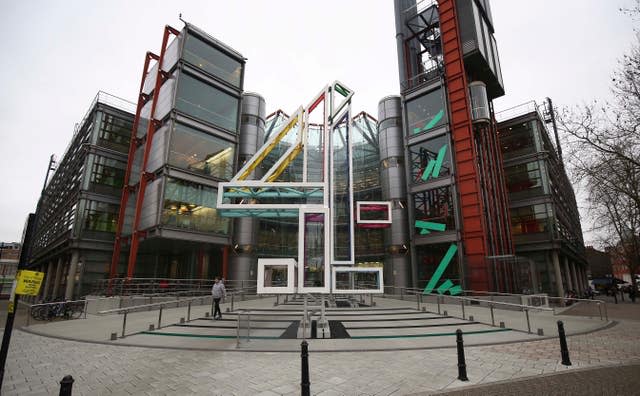Channel 4 boss’s salary passes £1 million
Channel 4’s chief executive received a salary of more than £1 million last year, the broadcaster’s annual report shows.
Alex Mahon was handed the biggest bonus possible after the number of people watching the company’s programmes online boomed. She was paid £1.2 million in 2021, compared with £991,000 a year earlier, as her variable pay jumped 62%.
The figure comes as, under plans announced earlier this year by the Government, the broadcaster, which has been publicly owned since its creation in 1982, will be put up for sale – a decision met with widespread criticism from the creative industry and politicians alike.
The annual report also showed that chief operating officer Jonathan Allan bagged a 5.5% pay rise, giving him £728,000, while chief content officer Ian Katz saw his package rise nearly 16% to £620,000.
The figures in the report also show that total pay for all Channel 4 employees dropped 4% during the year.
The company’s revenue also passed the £1 billion mark for the first time in its history – hitting £1.16 billion, far above the previous £995 million record.
The broadcaster said in a statement: “Channel 4 is wholly commercially-funded and not in receipt of any public funding.
“Executive salaries are benchmarked against and broadly comparable to other commercial broadcasters in the UK and the remuneration committee recommended the increase to recognise Alex Mahon’s leadership during a period of incredible creative and commercial success as well as significant uncertainty.
“In 2021, Channel 4 delivered a range of defining and award-winning programmes, the strongest-ever financial performance in its history, significant growth in digital advertising, record-breaking performance for All 4, and industry-leading investment in creating jobs and training opportunities for up to 15,000 young people every year.”
Figures from the BBC’s annual report for 2021/2022, also published this week, show that director-general Tim Davie’s salary rose more than 10% to £522,000.

It’s A Sin creator Russell T Davies, who has publicly spoken out against Channel 4’s privatisation, set out in the report the reaction from the public since the series aired in 2021.
He said: “I’ve received emails, texts and DMs every day, telling me how lives have changed as a result of the show – families now able to tell the truth about how their uncle died; men and women freely stating their HIV status out loud, for the first time, without shame; charities telling me that HIV testing numbers have gone through the roof.
“More than £500,000 for charity has been raised from the sale of a single T-shirt design, based on the show’s catchphrase.
“That, to me, is public service broadcasting. Far more than a service. It’s a joy.”
Ms Mahon said in her opening statement for the report that the decision to privatise “will inevitably have an impact on the organisation” and that “existing risks may be amplified or new risks may emerge, all of which must be managed as we continue to deliver on our remit”.
But she added: “Our job is to deliver what Parliament tasks us to do, and if or when that changes, I am confident that this incredible organisation will respond with the relentless energy it has always displayed in pursuit of its goals and the remit – making incredible shows for our audiences, creating opportunities for young people, and supporting the creative industries across the UK.”
Mr Katz vowed that in 2022 Channel 4 will be “doubling down on what we were created for: giving a voice to the unheard, challenging conventional thinking, and being a nurturing hothouse for the new – be it talent, ideas, or ways of making and distributing television”.
Following the success of shows like Joe Lycett vs The Oil Giant, the chief content officer said they will be “commissioning more splashy shows about the climate emergency, punching up at big polluters and empowering our audiences to take action”.
He added: “In 2022 Channel 4 will be surprising, subversive – and frequently silly. Many things, but never middle of the road.”
Earlier this week, Ms Mahon confirmed during a meeting with Digital, Culture, Media and Sport (DCMS) Committee that the release of the annual report had been delayed, due to the Government trying to intervene and change the wording.
She said the complete annual report had been submitted to the DCMS on May 23, adding that “there have been some delays to the normal process”.
“It is fair to say that the DCMS made some comments that they would have preferred to see in the report, particularly about our future financial sustainability.
“They have now agreed that the report can be submitted to Parliament in the normal course without any changes. I think it is the first time adjustments had been requested.”
The business also reported its highest ever surplus, hitting £101 million before tax, compared with £74 million a year earlier.
Views on All 4 – the company’s streaming service – were up 21% to 1.5 billion during the year.
The broadcaster said it is now “well on our way” to meeting its target to double digital views between 2020 and 2025.
Digital advertising revenue grew 40% to £161 million and accounts for nearly £2 in every £10 than the business makes. The company wants to make £3 from digital for every £10 that it earns by the middle of the decade.
Channel 4 was founded by the Conservative government of Margaret Thatcher and is entirely funded by advertising.

 Yahoo Finance
Yahoo Finance 